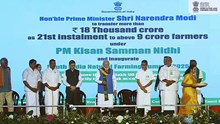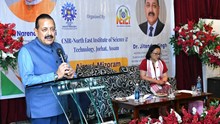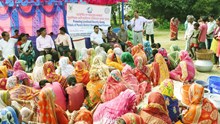
As we start the interview in the makeshift studio at African- Asian Rural Development Organisation’s New Delhi headquarters, I ask Dr. Manoj Nardeosingh, Secretary General of AARDO to walk us through what his organization does. He starts by giving us a brief of the organization, “AARDO is an international and inter-governmental organization connecting Asia and Africa for rural and agricultural development. It is a manifestation of solidarity between African people and Asian people to support each other, find solutions, find cooperative projects, and implement them for the development of communities on these continents. It was established in 1962, and we celebrated the 60-year anniversary in 2022.”
He then went on to explain the purpose of AARDO and briefly touched on the subject of its member countries, saying “We are also now advocating technology dissemination for rural development. We are an organization promoting cooperation and we have got flagship programs in human resource development. Besides that, we have got centers of excellence located in the 12 member countries running high-level human resource development programs while also supporting exchanging of experts and a few development pilot projects in African and Asian countries.”
He continued by saying, “Given that we have got a multitude of countries, we are also working on three different languages, we promote all our programs and exchanges in 3 different languages that are English French, and Arabic. We strongly advocate rural development to be in the mainstream economic growth, especially in these two contents where we know the majority of the population is living in the rural area.”
His statement raises the question of what common problems has he found in the Asian and African countries under AARDO during his time at the organization. Answering it, he listed a number of problems ranging from unemployment to the lack of healthcare holding back the development of their member countries.
“We have found around 20 issues faced by the rural areas, and most of them are related to the agriculture sector. Getting access to institutions is a huge problem and so is the lack of health infrastructure and the rising rate of unemployment,” said the Secretary-General.
Focusing on the agriculture sector he mentioned that AARDO member countries have got low productivity as compared to other developed countries. While women empowerment is another big issue they are working on.
He said, “In the agriculture sector, the problem of wastage in post-harvest is a huge problem. The lack of tech and low farm mech, low-value addition in agriculture is also a major drawback.”
As the year 2023 has been declared as the International Year of the Millets, I asked Dr. Nardeosingh what AARDO’s plans are around the international initiative.
The Secretary General of AARDO had recently attended the Millets Conference organized by Krishi Jagran as the Guest of Honour and was looking forward to his own organization’s initiatives. He explained, “AARDO will of course be participating in the international year of millets. Mainly through workshops where we will be disseminating knowledge about the use of tech in growing millets. We are already planning a round table meeting on millets in March where our main goal is on enhancing the productivity of millet so we get better varieties of millets.”
Since I received the confirmation for this interview, I had this question making rounds in my head: what would an inter-governmental head’s vision of a sustainable country look like?
The response I got satisfied my curiosity perfectly well. Dr. Manoj answered by saying, “Sustainability is a term that has been talked about globally for years now. I think that sustainability will only work if it starts on the ground level, keeping the planet, community, and economy in mind. Sustainability only works when it is inclusive. The two main parameters that are SDG1 and SDG2 are still not achieved in most countries. A country will be sustainable if it attains the first two goals first among the 17 goals, then we can classify the country as going towards sustainability. Several countries are popularizing the concept of inclusive growth, decreasing the gap between groups but I think a lot of effort is still needed.”
My next question was very direct: With all the work AARDO has done in various poverty-stricken countries, has AARDO found a solution to the vicious cycle of poverty?
Dr. Nardeosingh started by explaining the current situation. He said, “Poverty is defined as the lack of resources, low income, and low investment on both individual and economic levels. AARDO is making sure that there are economic activities for the diversification of agriculture and value addition are generated in the countries so that they can combat the vicious cycle of poverty.”
He then went on to explain AARDO’s model of microfinancing, one of its efforts in the war against poverty, “We have got a model called the AARDO model of microfinance in which we provide a small amount of seed capital given to a cooperative society where people come together, and make use of that fund for economic activities so that they can return the fund. At the moment, it is going on in Jordan and we are currently encouraging women to make use of this program.”
“We also have a program in South Korea where everybody in a village is taken aboard and poverty is tackled there. Then, we also have got the model of Malaysia, a founder member country, where the program is classified as a killer of poverty. These types of programs are successful, and we have a program running in India as well. When members from AARDO countries come for training, they are trained in this program.,” the Secretary-General concluded.
More questions were bubbling up in my head but I asked the one I thought people would want to know the answer to as much as I did: What motivates him on a personal level to work for the betterment of society, especially the largely unseen rural people?
His response was one for the books. He answered, “I believe in creating bridges, not walls. AARDO allows us to build these bridges. I think this is a noble course and the nobleness of this course motivates me to work for the betterment of society. And AARDO is a wonderful platform where we connect our member countries to share our experience, technology, and research. My aim is to see that all these things happen.”
(The Interview was taken by Binita Kumari, Journalist, Krishi Jagran)














Share your comments